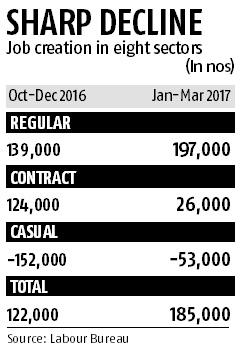
In January-March 2017, regular jobs rose while jobs for contract workers slowed to 26,000 against 1,24,000 in the previous quarter.

During January-March 2017, job creation stood at 185,000 against 122,000 in October-December 2016 and 32,000 in July-September 2016. Credit: Wikimedia Commons
New Delhi: The government’s demonetisation of high-value currency notes in November last year affected job creation among daily wagers and contract workers, even as regular jobs continued to grow, shows the latest official survey of enterprises, issued by the Labour Bureau.
During January-March 2017, job creation stood at 185,000 against 122,000 in October-December 2016 and 32,000 in July-September 2016, according to the bureau’s fifth quarterly report on employment. The report covers eight sectors – manufacturing, construction, trade, transport, accommodation and restaurants, information technology (IT), education and health. These constituted 81% of all employment provided by enterprises with a workforce of more than 10 each.
Also read: Unprecedented Job Losses, Wage Decline in Unorganised Sector Post Demonetisation
The survey showed regular jobs rose by 1,97,000 in January-March 2017, compared with job creation of 1,39,000 the previous quarter. However, the pace among contract workers slowed to 26,000 in January-March, against 1,24,000 in the previous quarter. Casual workers — getting wages on a daily basis — declined by 53,000 in the fourth quarter of 2016-17. The fall was a bit slower than a drop of 152,000 the previous quarter.
Experts said that there was a shift in the nature of jobs, instead of job loss, after the government decided to demonetise currency notes of Rs 500 and Rs 1,000 on November 8 last year.
“In the organised sector, there was an uptick in employment of fulltime workers who were paid by cheques or through bank accounts but the number of contract and casual workers, paid by cash, declined during this phase,” said Pronab Sen, country director, IGC’s India Central Programme and former chief statistician to the government.
Among contract workers, there was a slowing in job creation in the manufacturing, trade and IT sectors. And, job losses in construction, transport, accommodation and education. The pace of job creation among contract workers slowed in all sectors, except health, during January-March this year.
Construction sector workers grew 2,000 in January-March, against a dip of 1,000 the previous quarter. The manufacturing sector saw 102,000 more jobs, as against 83,000 the previous quarter. Further, the accommodation and restaurant segment saw job creation for the first time in three quarters, the survey showed.
While of job creation remained stagnant in the IT sector, it slowed in the education sector. New jobs there stood at 2,000, compared to 18,000 in the October-December period.
By arrangement with Business Standard.



